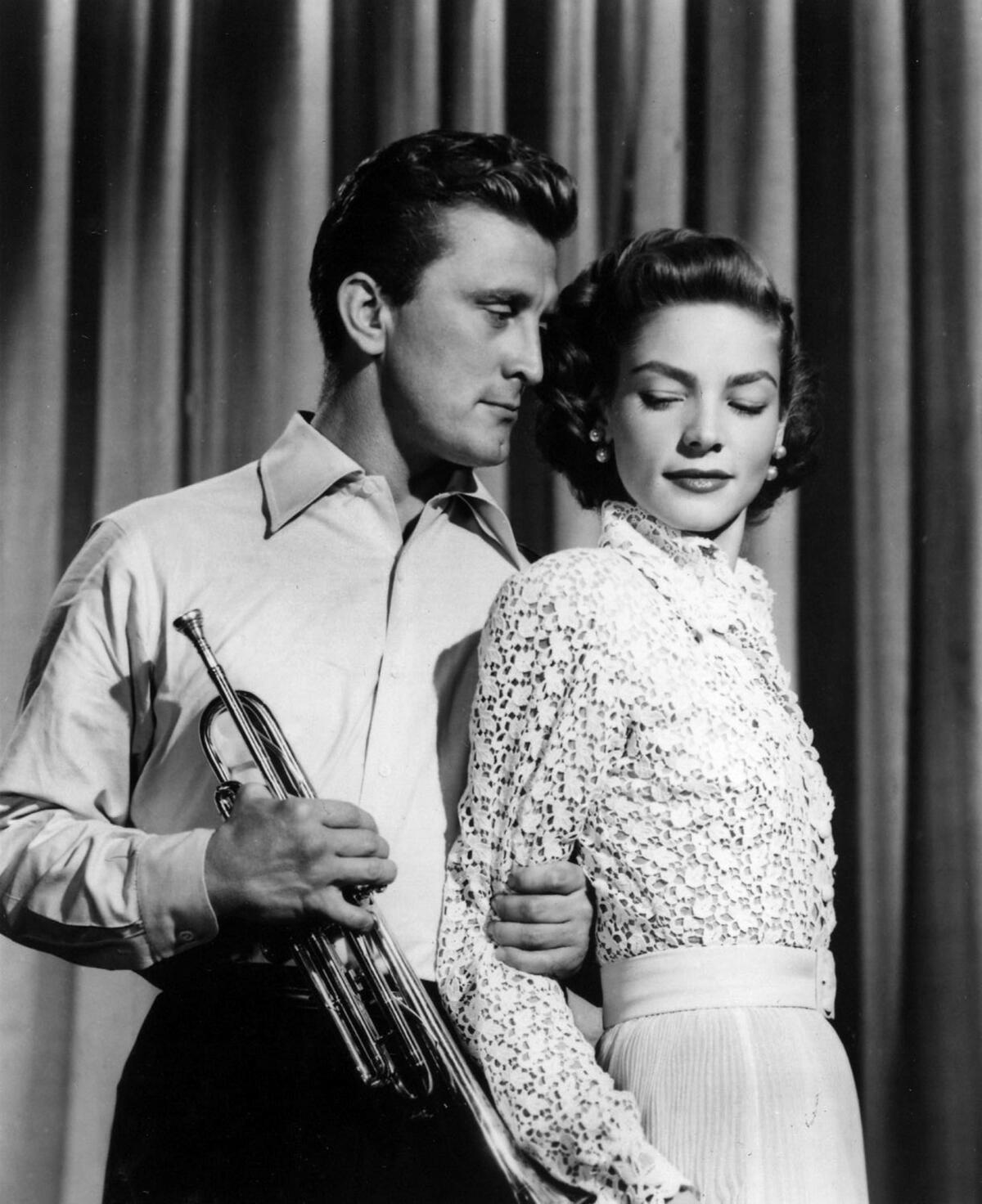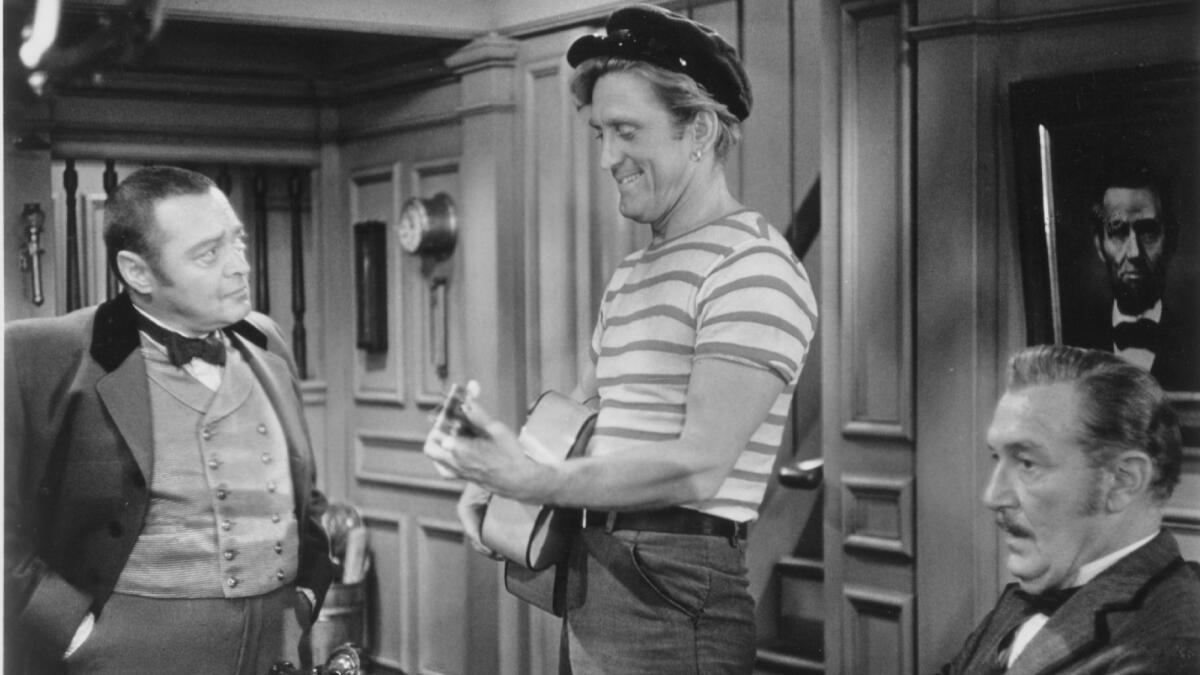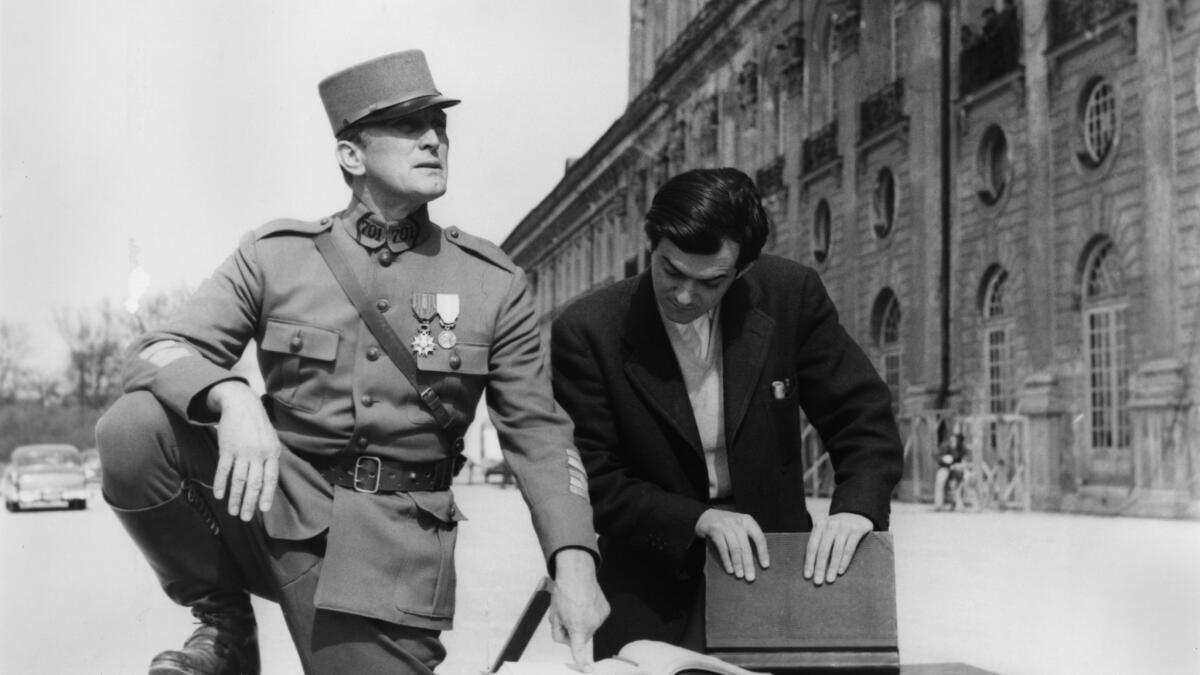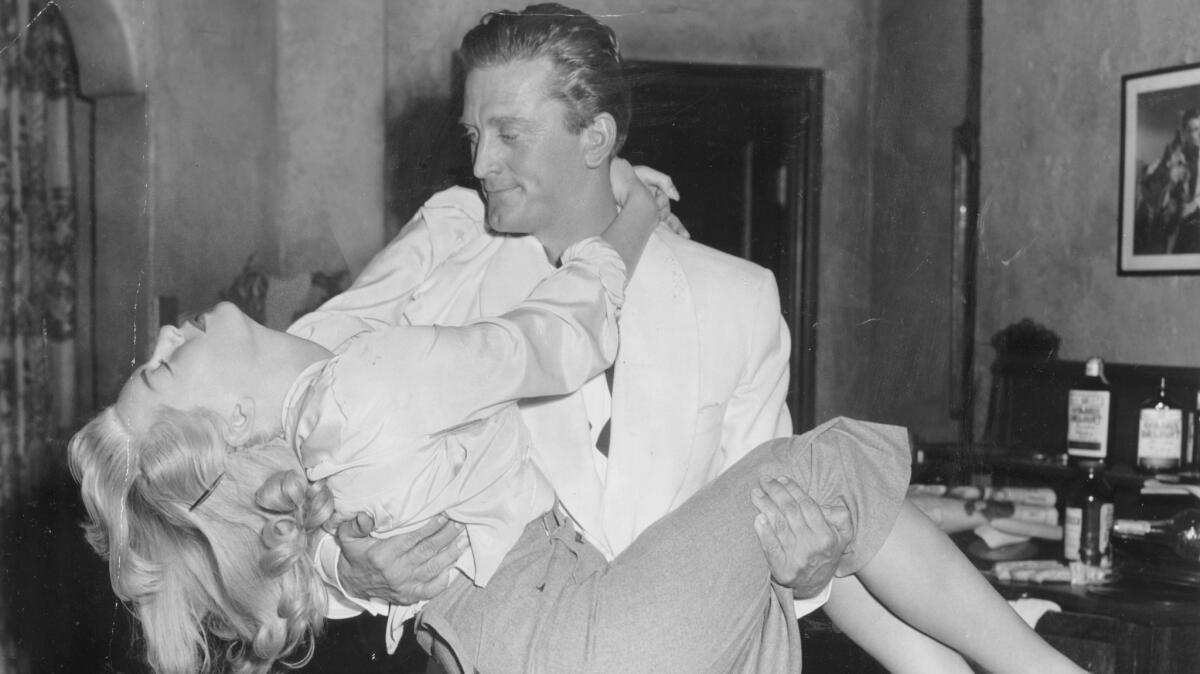As Kirk Douglas turns 100, a major UCLA retrospective looks at his amazing body of work
I recently spent a day with Kirk Douglas, and the experience was exhilarating, energizing and surprising.
This was not time spent with the vital actor himself, who turns 100 on Dec. 9, but rather with a generous sampling of the films still to be shown in the UCLA Film & Television Archive's continuing series "Kirk Douglas: A Centennial Celebration" at the Hammer Museum's Billy Wilder Theater in Westwood.
Seeing a number of Douglas movies one after another both confirms and challenges your preconceptions about the actor.
To be sure, few performers have exuded joy in the physicality of stardom as energetically as Douglas. This was someone who not only lit up the screen but seemed capable of powering the entire theater should the necessity arise.
But immersing yourself in Douglasiana also highlights that this was an actor who had more range than he is always given credit for, an actor who could go from arrogance to despair in a single shot and often took on non-commercial projects simply because they appealed to him.
What finally seems most remarkable about Douglas is his gift for being at the same time defiantly himself and convincingly other people. Just as you would never mistake Douglas for any other actor, neither would you easily confuse one performance with another. His characters, in their yearning, desperation and fury, were always and forever completely individual.

That said, just to amuse myself I was able to place the films I saw into a trio of overlapping categories: the classics, the brawny entertainments and the unexpected ensembles.
Two unmissable classics share the screen this Friday 1949's "Champion" and 1950's "Young Man With a Horn."
A bleak film noir disguised as a boxing picture, "Champion" made Douglas a star and also got him the first of three Oscar nominations. In it, Douglas portrays the tormented fighter Midge Kelly. Directed by Mark Robson and written by Carl Foreman from a story by Ring Lardner, "Champion" unsparingly shows the cost of succeeding in a conniving world where finer feelings do not stand a chance. Even today, Douglas' ability to create almost inhuman fury and raw emotionality on the screen is a shock to experience.
Just as he did his own boxing in "Champion," Douglas learned to play the trumpet so his scenes as an obsessed, Bix Beiderbecke-inspired musician in "Young Man With a Horn" would look convincing. He costars with old pal Lauren Bacall, who helped him break into Hollywood, and Doris Day, whose sophisticated, seductive voice singing "The Very Thought of You" makes a strong impression.
Once he became a major star, Douglas enjoyed turning out heroic entertainments like 1965's "The Heroes of Telemark" (screening Aug. 19), a brooding World War II epic directed by Anthony Mann and evocatively photographed in snowy Norway by Robert Krasker.
Douglas, old enough by then to have to share the hero billing with a younger Richard Harris, stars as a Norwegian scientist who gets involved in a Resistance scheme to sabotage Nazi plans to build an atomic bomb of their own.
Two of Douglas' best remembered brawny features, both directed by Richard Fleischer, came to the screen a decade earlier and share an Aug. 28 double bill.

Released in 1954, "20,000 Leagues Under the Sea" was a much-beloved Disney family adventure, indelible for James Mason's evil Captain Nemo and an intense battle with a giant squid. But it also features Douglas as a fun-loving harpooner who gets to lustily sing "A Whale of a Tale."
"The Vikings," made four years later, is equally improbable, though Douglas manages to be convincing as a Norse berserker capable of head-butting a monk and kicking his way through a stained glass window, all in gorgeous Technicolor shot by the great Jack Cardiff.
Enmeshed in a pulp plot that has him vying with his half-brother (played by Tony Curtis, of all people) for the hand of Janet Leigh's Christian princess, Douglas does get off some good lines. "If I can't have your love," he bluntly informs the princess, "I'll take your hate."
But though you might not guess it from these films, Douglas also had a taste for thoughtful, significant films where his presence was essential to success but in the final analysis only one of a number of factors leading to these films becoming classics.
This was especially the case with 1958's "Paths of Glory," directed by Stanley Kubrick and screening on Aug. 27 on a double bill with 1953's "The Juggler," with Douglas as a German concentration camp survivor in the first Hollywood film to be shot in the state of Israel.

Showing in a fine UCLA restoration of Georg Krause's memorable black and white cinematography, "Paths of Glory" features Douglas in one of his most dynamic performances as a French officer in World War I horrified by the conflict's stupendous waste of human life. The film was so unapologetic about the callousness of France's military high command that it was banned in that country for 18 years.
Said to be Douglas' favorite of his dozens of features for its celebration of individualism is 1962's one of a kind "Lonely Are the Brave," directed by David Miller from Dalton Trumbo's excellent adaptation of the Edward Abbey novel.
Screening Aug. 20, it stars Douglas as a contemporary cowboy who unhesitatingly faces off against a modern world intent on fencing him in.
Though Douglas is indisputably the star, he has expert support from costars Walter Matthau and Gena Rowlands as well as cinematographer Philip Lathrop and composer Jerry Goldsmith.
Closing the Douglas celebration on Sept. 30 is 1952's "The Bad and the Beautiful," a film that's one of the best of an always popular breed, the inside-Hollywood melodrama.

Giving a vigorous but unusually restrained performance under the sure hand of director Vincente Minnelli, Douglas is impeccable as dynamic love-him-or-leave-him producer Jonathan Shields.
Said to be inspired by David O. Selznick, Shields is shown in extensive flashbacks alternately helping and betraying a series of colleagues, including Lana Turner's actress and Dick Powell's screenwriter. Good at what he does, as charming as he is ruthless, Shields is described as "not a man, he's an experience." Which is not a bad way to sum up the actor who brought Shields and so many others to magnificent life.
--------
Where: Billy Wilder Theater, Hammer Museum, 10899 Wilshire Blvd., Westwood.
Price: $10
Contact: (310) 206-8013, www.cinema.ucla.edu
All screenings at 7:30 except as noted.
Aug. 5: "Champion," "Young Man With a Horn"
Aug. 14 at 7 p.m.: "Posse," "Tough Guys"
Aug. 19: "The Heroes of Telemark"
Aug. 20: "Lonely Are the Brave," "Strangers When We Meet"
Aug. 27: "The Juggler," "Paths of Glory"
Aug. 28 at 7 p.m.: "20,000 Leagues Under the Sea," "The Vikings"
Sept. 11 at 7 p.m.: "The Indian Fighter," "Last Train From Gun Hill"
Sept. 18 at 7 p.m.: "The Strange Love of Martha Ivers," "Out of the Past"
Sept. 30: "The Bad and the Beautiful," "Two Weeks in Another Town"
Only good movies
Get the Indie Focus newsletter, Mark Olsen's weekly guide to the world of cinema.
You may occasionally receive promotional content from the Los Angeles Times.








